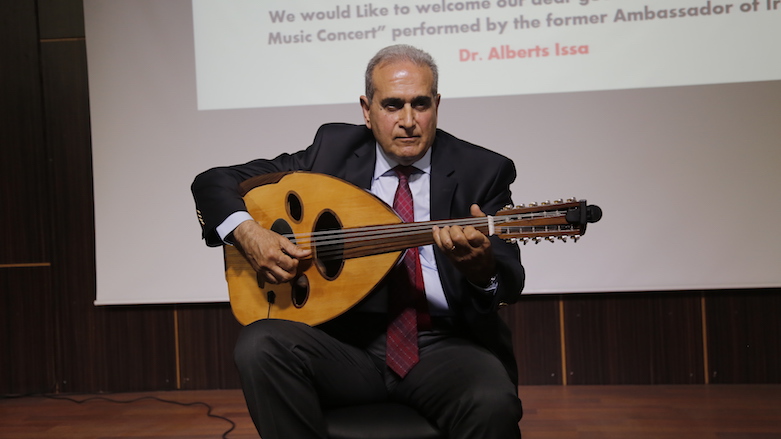On oud and identity

ERBIL, Kurdistan Region (Kurdistan24) - A soft-spoken figure with a passion for playing the oud, Albert Issa is arguably a rare soul to come across among the array of diplomats from Middle Eastern countries.
Issa who between the years 2009 and 2015 served as Iraq's ambassador to Denmark spoke to Kurdistan24 over the weekend about his music, life, one-term career in diplomacy and converging identities.
He regularly teaches courses in international relations at the Lebanese-French University, and Salahaddin in Erbil, the capital of the Kurdistan Region.
The author of several books in Kurdish and Arabic, he has written on parallelisms between the 20th century Italian Fascism, German Nazism, and Arab Baathism.
Born in 1951 in the Kurdish city of Sulaimani to parents of Christian faith, Issa considers himself Chaldean-Assyrian-Syriac, three names he says "for one entity."
"The question of ethnicity is one of a feeling. I feel, and also think, [as] Kurdish," he states.
His father was from the town of Aksaray in today's central Turkey; who as a child survived the Meds Yeghern, the genocide and mass deportations of the Armenian people that the then Ottoman Empire's government committed in 1915.
"They escaped with two blankets. I still have the land title in Ottoman Turkish of our house in Aksaray," Issa reveals about his father's family.
"I never learned the Armenian language," this refined man laments, explaining that his father who settled in Sulaimani died when he was just 12.
Issa is a polyglot though.
Along with his mother tongue Assyrian, he speaks Arabic, Kurdish, Turkish, Italian, French and English, all of which he one way or another actively uses in his daily life.
A musician, and composer, he has released only one album so far, in France of 1995.
[Former Iraqi diplomat and oud composer Albert Issa performs for students and staff at the Lebanese-French University in Erbil, Kurdistan Region, April 5, 2017. (Photo: Kurdistan24)]
Music, Issa believes, can change an "underdeveloped society like ours" for the better.
"Unfortunately we don't ascribe enough value to music," he says, speaking of it as an antidote to an ever-deepening violence and turmoil in the Middle East.
"Here, we live in a 'survival society.' I mean the most important thing for people is to have money, to answer their primary needs. We are in crisis," Issa resents the fact that science and arts are neglected.
He recalls that he began learning to play the accordion and later violin when he was 17.
"I then became a member of the Sulaimani Musical Group which was well-known throughout Iraq," he remembers.
Issa was a student of William Youhanna, a teacher of music in Sulaimani in the early 1970s.
But he has a unique penchant for playing the oud.
"No matter where I go, I carry the oud with me. It has been in my hands at every airport I have landed."
Issa plays the oud every day, and sometimes for his students and colleagues as well after a lecture.
Recently, on April 5 he gave a concert that mostly featured his compositions as well as traditional works at the Lebanese-French University to a group of some one hundred people.
He names his pieces in Kurdish.
"My music, for one, is essentially Kurdish," he explains.
Trîfey Mangeşew (Moonlit Night), Diyarî bo Xoşewîst (A Gift to My Lover), Hey Meryemê Meryemê (Oh Mary, Mary), Maqam Rast, Armenian Reminiscents are a few among the many he composed over the last several decades.
Issa takes particular pride in having participated in the formation of another musical group named as 'Shorsh,' Kurdish word for revolution during the Kurdish uprising in 1974 against the Iraqi Baath government in Baghdad.
While serving in Copenhagen as Iraq's top representative, Issa used to give concerts to fellow diplomats from other countries.
Poznan, Warsaw, Krakow in Poland, Bergen in Norway, Paris, Strasbourg in France, Florence and Turin, Italy where he studied international relations in the early 1980s are some of the European cities where he performed.
"It is very difficult to reconcile politics and diplomacy with music," he declares, adding he is defying the notion.
Editing by Ava Homa
